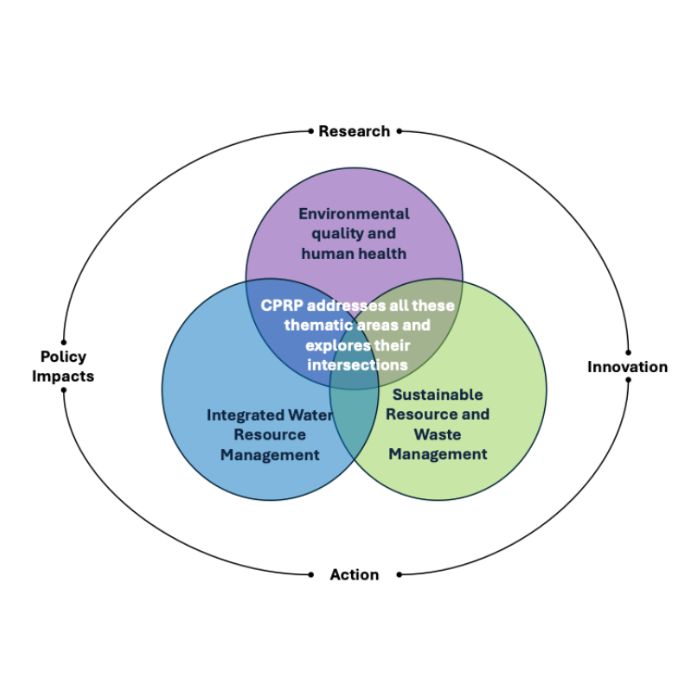Research areas
CPRP Approach and Themes
Operating with an interdisciplinary ethos, Centre for Pollution Research and Policy is pioneering an interdisciplinary systems-based approach that views the natural environment as the life support system underpinning our modern lifestyles. Recognising that societal factors, along with policy and economic decision-making, directly influence environmental health and sustainability, this holistic perspective enables integrated solutions to pressing challenges. This strengthens the scientific foundations for new policies and regulatory priorities for pollution control.
CPRP focuses on three key strategic areas of high political relevance, yet weak scientific underpinning, ensuring that our efforts are timely and transformative:
- Environmental quality and human health
- Integrated Water Resource Management
- Sustainable Resource and Waste Management

Environmental Quality and Human Health
Environmental quality is closely connected to human health. Improving environmental conditions is essential for ensuring access to clean water and food, promoting human well-being, and maintaining sustainable, healthy living conditions globally. To promote environmental and human health quality, CPRP members undertake research in the following areas:
- Mechanistic understanding of chemical exposure: Establishing cause-effect relationships by investigating mechanisms that underpin biological and physiological responses to chemical exposure in animal and human health.
- Monitoring of chemical pollution: Development of state-of-the-art analytical methods to measure multiple contaminant classes across different environmental compartments (e.g. water, sediment, soil, biota) to characterise the chemical space and fate in the environment.
- Developing Predictive Approaches: Development of innovative techniques, tools and workflows to detect early signs of environmental stress and toxic exposure in wildlife and humans, with an emphasis on mechanisms of disease, test method development and new approach methodologies (NAMs).
- Assessing Contaminant Impacts: Investigating the effects of pollutants, including microplastics and chemical contaminants, on ecosystems and human health to inform risk assessment and regulatory actions.
- Promoting Environmental Health: Advancing research on the links between environmental quality and public health, advocating for policies that protect ecosystems and reduce health risks.
Integrated Water Resource Management
Integrated water resource management is crucial for maintaining a healthy environment and meeting one of humanity's most essential needs. While sustainability in this field is vital, it faces significant challenges. Members of the CPRP are actively working in the following key areas to ensure that research supports practitioners and policymakers in making feasible, viable, and sustainable decisions:
- Waterbody Ecological and Chemical Status: Understand the sources, transport pathways, of pollutants in aquatic systems, and investigate their fate and impacts on biota and ecosystem services.
- Strategic Asset Management: Developing decision-making tools to strategically prioritise investments in water industry assets and infrastructure. Reveal vulnerabilities in wastewater systems that are operating at (or over) their design capacity.
- Integrated Catchment Management: Implementing holistic strategies for managing entire catchment areas to enhance water quality and ecosystem health.
- Water Governance and Regulation: Investigating the role of institutions, governance, and regulation in achieving sustainable water use and protecting freshwater systems.
Sustainable Resource and Waste Management
Sustainable resource and waste management is essential for creating a future where resources are used responsibly, and waste is minimized. Consumerism, private interests, shortsighted decision-making, and quick fixes have contributed to inefficient resource systems and value chains. To move beyond these limitations, we must embrace innovative, system-wide thinking that promotes holistic, integrated solutions. CPRP members are tackling key global challenges in this area through the following research focus:
- Maximizing Resource Efficiency: Developing and advocating for strategies that enhance resource use efficiency, minimize waste, and accelerate the shift towards a circular economy.
- Plastic Waste and Sustainable Alternatives: Investigating the environmental and human health impacts of plastic waste, while creating material, social, and policy-driven solutions to reduce reliance on plastics and foster sustainability across the plastics value chain.
- Sustainable Waste Management Systems: Evaluating and integrating sustainable practices across production, usage, and waste management to build advanced, systems-based insights that inform strategic decision-making and cross-value chain approaches.
- Policy and Governance for Sustainability: Analysing and shaping policy frameworks that regulate resource use and waste management, championing interventions that support sustainability, and ensuring robust governance at all levels.
Public Lecture Series: Plastic, Pollution and the Planet – Stemming the Rising Tide
Public Lecture Series: Plastic, Pollution and the Planet – Stemming the Rising Tide
We’ve uncovered the damaging cocktail effect of chemicals, contaminants and plastics in our society. Is there a solution to this tsunami of pollution?